
Online or in person, shop small and local businesses this holiday season (Letters)
Online or in person, shop small and local businesses this holiday season Black Friday, Small Business Saturday, and Cyber Monday mark the most important stretch of the year for many founders like me. For small brands, holiday sales don’t just fuel growth, they often determine […]
Letters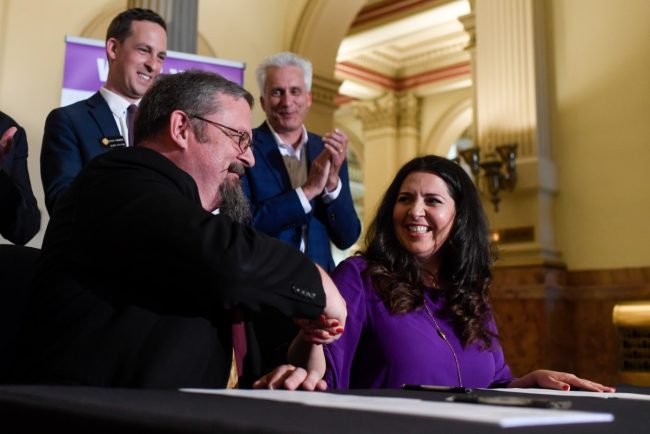
Hit back at Trump’s assault on democracy by repealing Colorado’s independent Redistricting Commission (Letters)
Repeal the independent Redistricting Commission In 2018, voters created the independent Colorado Congressional Redistricting Commission in order to reduce partisan gerrymandering in the creation of congressional districts. The commission is prohibited from drawing district lines that protect any political party. This has worked well, for […]
Letters
Ken and John Salazar: Despite decade of planning for San Luis Valley land conservation, state could break yet another promise to southern Colorado
You can’t separate the history of Colorado from the iconic natural landscapes of the San Luis Valley, the first part of our state to see settlers who came from what is today New Mexico to farm and graze this land. The farmers provide the food […]
Columnists


DIA would be smart to add nuclear as it’s now officially “clean” (Letters)
DIA smart to add nuclear as it’s now officially “clean” Re: “DIA to explore nuclear energy as power option,” Aug. 7 news story I commend Denver Mayor Mike Johnston and the CEO of Denver International Airport, Phil Washington, for taking a forward looking step toward […]
ColumnistsDIA smart to add nuclear as it’s now officially “clean”
Re: “DIA to explore nuclear energy as power option,” Aug. 7 news story
I commend Denver Mayor Mike Johnston and the CEO of Denver International Airport, Phil Washington, for taking a forward looking step toward addressing DIA’s future energy needs by seeking proposals to study the feasibility of building and operating a small modular nuclear reactor (SMR) onsite. As air travel demand and electrification accelerate, ensuring a reliable, carbon-free power source will be essential to keeping DIA both competitive and sustainable.
Small modular reactors offer the promise of steady, around the clock electricity without greenhouse gas emissions — a critical complement to Colorado’s renewable energy portfolio. This year the Colorado legislature passed, and Gov. Jared Polis signed House Bill 1040, adding nuclear power to the list of clean energy resources that can be used to meet State clean energy goals. By exploring this option now, Denver positions itself to meet future demand with innovation, resilience, and environmental responsibility.
We should welcome this study as a smart investment in our region’s energy and economic future.
Art Curtis, Lakewood
Cutting mRNA research threatens cancer patients like me
Re: “RFK Jr. cancels $500M in funding for vaccine development,” Aug. 6 news story
As a cancer survivor three years in remission, I am deeply alarmed by the Trump administration’s recent decision to cancel $500 million in ongoing mRNA research. This move is not based on science but on political appeals to anti-vaccine sentiment.
My own chemotherapy and surgeries failed; only immunotherapy worked. The same mRNA technology now being abandoned for vaccine development is also at the forefront of cancer treatment research. It holds the promise of training the immune system to attack tumors with precision–offering hope to millions battling cancer now and in the future.
By cutting this funding, the U.S. is surrendering its leadership in medical innovation and delaying life-saving therapies. If my cancer returns, I want my oncologist to have access to the best, most advanced immunotherapies possible–not treatments held back because political leaders chose ideology over science.
This decision does not just jeopardize pandemic preparedness–it undermines the future of cancer care for patients like me.
Gregory Sullivan, Littleton
Don’t talk down to Democrats
Re: “Democratic Party needs to allow space for different voices” Aug. 8 commentary
I am sure Jenny Robins’ opinion column was well-intentioned, but it was also emblematic of why people are leaving the party. Her statement wreaks of elitism: “That means welcoming and not dismissing people who are still learning, evolving, and trying to do better.”
It implies that people who are not part of the Democratic Party are somehow ignorant or don’t understand, and consequently, are not on the same level and need to improve. She also goes on to imply that unless an individual embraces all principles of the Democratic Party, they are somehow less than perfect. I found her statements to be very condescending.
Perhaps Robins should take a step back, let go of her sense of superiority, and try to understand that people are leaving the Democratic Party because they are actually informed. More to the point, perhaps the Democratic Party needs to learn, evolve, and try to do better to increase its numbers.
Rick Accountius, Longmont
Sign up for Sound Off to get a weekly roundup of our columns, editorials and more.
To send a letter to the editor about this article, submit online or check out our guidelines for how to submit by email or mail.

Where are America’s youth at the protests fighting for our democracy? (Letters)
Youth need to join the march As a Vietnam veteran, I remember in the 1960s and early ’70s when protest rallies were breaking out throughout the country, most of them on college campuses, expressing rage about the Vietnam War and other issues. The youth of […]
LettersYouth need to join the march
As a Vietnam veteran, I remember in the 1960s and early ’70s when protest rallies were breaking out throughout the country, most of them on college campuses, expressing rage about the Vietnam War and other issues. The youth of the country was alive and vibrant. Today, while our democracy, institutions, and form of government are being eradicated, they, who have the most to lose, do not seem to want to get involved.
I have attended most of the protest rallies taking place in our area, and, I am sad to say, witness mostly seniors attending. This brings to mind two songs from the ’60s and ’70s. One is by Crosby, Stills, Nash and Young — “Ohio” — about the four students who were shot and killed by National Guardsmen during a protest on the Kent State University campus. The other is by Pink Floyd and seems to be a good description of today’s youth, “Comfortably Numb!”
Steve Nash, Centennial
A barrage of bad news followed by some good recipes
Another beautiful day in Colorado was marred by reading the first section of The Denver Post. “ICE to open 2nd state facility” was the top headline of the front page. The news didn’t get any better as I proceeded through the pages:
• Sending the National Guard to Washington, D.C. for law enforcement in the city with a declining crime rate;
• a budget shortfall in Medicaid for Colorado due to the “One Big Beautiful Bill” signed by President Trump;
• research projects at the National Oceanic and Atmospheric Administration (in Boulder) canceled and employees laid off;
• order by the White House for a review of Smithsonian exhibits to be sure the exhibits align with Trump’s interpretation of American history;
• Trump’s selection of an underqualified person to head the Bureau of Labor Statistics;
• fires on the Western Slope;
• the meeting of Trump with Vladimir Putin to discuss Ukraine, among other topics, without Zelenskyy present;
• Israel discussing resettling Palestinians;
• climate changes bringing droughts that have long-term ramifications, including groundwater depletion; and,
• the interesting thoughts of a Jackson, Wyo. resident checking out the cost of living in Aspen vs. Jackson Hole.
Important news for all of us to consider as we look forward to how these events will impact our lives and think through what our responsibility is in relation to these stories. Any suggestions? Anyone interested in joining a discussion group to explore solutions?
P.S. Thanks for the delicious recipes in the third section!
Andrea M. West, Centennial
Too hot for school
This time of year, just like every year, people will be complaining that the school classrooms are too hot for the students. When I was young, we started in September. Now they start in the middle of August. All the educated people who are running the school still don’t have enough sense to start it two to three weeks later.
Leroy M. Martinez, Denver
How about a round on the house?
Rockies owners Dick and Charlie Monfort are missing a golden opportunity to increase attendance at their sandlot-league games. There wouldn’t be an empty seat if every time the visiting team scored seven or more runs, we got a free beer.
Jeffrey Stroh, Denver
Sign up for Sound Off to get a weekly roundup of our columns, editorials and more.
To send a letter to the editor about this article, submit online or check out our guidelines for how to submit by email or mail.

We need to ask what the risks are to borrow another billion for Vibrant Denver (Letters)
A $950 million leap of faith Re: “Johnston’s early bond issue is a gamble,” August 10 commentary The Denver Post editorial board, while calling Mayor Mike Johnston’s $950 million bond for about 60 projects plan a “gamble,” nonetheless endorsed it — praising the Denver City Council […]
LettersA $950 million leap of faith
Re: “Johnston’s early bond issue is a gamble,” August 10 commentary
The Denver Post editorial board, while calling Mayor Mike Johnston’s $950 million bond for about 60 projects plan a “gamble,” nonetheless endorsed it — praising the Denver City Council for doing the “best they could” without offering detailed, line-item examples of why the board does not “love everything on the list,” or where the money will go.
The board admits Denver’s infrastructure is struggling, from undefined external and internal causes, and even suggests the general fund might be a “more prudent” fix. Yet it still backs adding nearly a billion in new debt because it “could bring work and development.”
Only the cost of five of the projects were mentioned: $139 million for repairs to the 6th and 8th Avenue bridges, $2 million for a bike park to be located “somewhere,” $20 million for a “someday” skate park, and $20 million to “begin planning” an American Indian cultural embassy that currently has “few details.” Together, these account for less than 20% of the total. Where is the remaining $769 million going, and is it justified? What specifically does the board not “love,” and why?
Rather than publish these questions — and the answers — the board leans on the mayor’s warning that property taxes will rise if the bond fails, and that older debt will be paid off faster, without explaining why that is a problem.
If the Post truly did its due diligence, it should disclose, along with the Johnston administration and the Denver City Council, the good, the bad, and the questionable impacts of borrowing $950 million. Without that, asking voters to approve it is a leap of faith Denver should not take.
John R. Benitez, Denver
Boomers clap back: It would be a financial burden to give up homes
Re: “Dear Boomers,” Aug. 10 letter to the editor
I read the commentary on the author telling us boomers to move on and give up our houses. I did not get a house until I was 53 years old. It seems like the 30- to 40-year-olds think they are entitled to a house. If they are 30 to 40 years old, their parents are boomers. Move into your parents’ house when you move them to a retirement community, where the rent can be around $5,000 to $7,000 a month.
Melissa Davis, Denver
Am I even reading this right?! You are asking me to sell my beloved home ( below market value, no less! ) because you have decided I don’t need that much space and you want it? The audacity is astonishing! I don’t know how blaming boomers for every challenge in life became a thing, but I am sick and tired of it.
I have had plenty of hardships in my life, including saving enough money to purchase my first home when mortgage rates exceeded 12%. It was a neglected fixer-upper in a sketchy neighborhood. Not my ideal home, and certainly not my ideal neighborhood, but a path to just get into the market and start building equity. A ton of sweat equity was necessary, which consumed most of my weekends.
Condos can still be very affordable, even in tight markets like Denver. There is also no shortage of affordable housing to be found in cities and states that are not trendy or cool. Since you are comfortable asking me to move, I suggest that perhaps you can move to one of those places. You start where you can. Accept the fact that your first home will not be your dream home.
Almost every problem has a solution if you look hard enough. For your own sake, learn how to deal with and navigate adversity. Blaming boomers, while asking for their charity, will not help you achieve your goals.
Maribeth Gruenloh, Littleton
I hear you and I am taking action. As a young woman, I never married and also never made a high salary while working in government (not corporations). I was lucky, however, because buying a home was possible for me due to realistic home prices. Then, the overarching mantra that “no amount of money is ever enough” took over, and home prices soared due in large part to developers building only for the rich, and everyone wanting “extra income” by renting out their second (and third) homes as short-term rentals.
I have acknowledged my extraordinary good fortune in life. It was not my hard work, not brilliant investment decisions; it was good luck based on when I was born. It is with this acknowledgment that I have conveyed my home to our local Community Land Trust (CLT), which provides affordable home ownership to lower-income households. My lovely home in Buena Vista will forever be sold to first-time homeowners at the price I paid for it 10 years ago.
Boomers do not need to leave 100% of their estate to their already grown and successful children; I found my way without a large inheritance from my parents. A portion of any estate is enough.
I believe we boomers are obligated to acknowledge our good fortune in life, and should try to put ourselves in the shoes of young adults today, who have no possibility of ever owning a home of their own, unless their millionaire parents provide for them.
Wendy Hall, Buena Vista
While surely heartfelt and not totally incorrect, the frustrated writer of this letter seems unaware of the bind the current housing situation is putting seniors in. I would love to move out of my home to a smaller place and have a family move into my house. But contrary to what the writer thinks, I still have a mortgage. Many of us do.
It would make zero financial sense for me to trade my home, financed years ago, for a smaller dwelling that would cost more to purchase and much more to finance. There are “senior communities” sprouting up, but they are not necessarily affordable. I have looked; odds are the letter-writer has not. There is nowhere I can go to have the same quality of life that is cheaper than where I am now. If the author finds it, they should go there.
Jennifer Askey, Boulder
Speaking out for the wild horses
Re: “State tries new solution for wild horse problem,” Aug. 10 news story
The article neglected to mention the elephant in the room, i.e., Big Ag’s influence and regulatory capture of the BLM.
This neglect perpetuates the big lie of wild horse overpopulation as justification for the cruelty inflicted during roundups of the horses and their subsequent detention in filthy off-range holding. The story failed to mention the destruction of America’s public lands, again by Big Ag, by their taxpayer-subsidized grazing of livestock, and the scapegoating of wild horses for such destruction.
Big Ag and the BLM depend on our silence and your neglect to sustain the violence they have inflicted on wild horses for decades. Big Ag and the BLM continue to inflict violence on wild horses with the firm intention of driving them to functional extinction, which, by the way, is what darting is meant to achieve!
The history of wild horse advocacy is replete with petitions, legislative attempts, phone calls, legal cases, and neglectful journalism, yet the gathers continue, the shipping to slaughter continues, and the populations are dwindling to unsustainable levels.
I sincerely hope you would consider a follow-up to your article in order to provide more balanced perspective.
Rick Karcich, Centennial
Mainstream media can’t claim principle of “objectivity”
Re: “DoBetterDNVR: anonymous troll or citizen journalist?” Aug. 10 commentary
The irony and hypocrisy of Krista Kafer’s scolding of a social media account’s lack of journalistic integrity is farcical.
She lists the “principles real journalists strive for: transparency, accuracy, and objectivity.” More than 30% of Americans don’t trust mainstream media today. This dreadful number didn’t occur in a vacuum but rather is the logical consequence of the media’s abject failure in all three departments. One needn’t have taken that high school journalism class she references to understand that adherence to those principles would have been counterproductive to its covert agenda: impeding a Trump presidency, something Ms. Kafer is keenly familiar with.
Overlook “transparency” and “accuracy” and still you’re stuck with “objectivity,” and here the media is dumbstruck. It simply can’t claim it with a straight face. It’s hard to hide the hate.
Jon Pitt, Golden
“No parking” adds another cost to Denver residents
Re: “Parking no longer required for new developments,” Aug. 6 news story
All but three of the Denver City Council members once again show they are out of touch with reality. They have now taken away the requirement that builders have to allow for parking spots to go with their projects.
Why do people move to Denver or Colorado? Not to walk around their neighborhoods or take a bus or a train, but to get in their cars and drive to where they can hike, hunt, fish, ski, or even mountain climb.
Now, because of the quest for “affordable” housing, they will be parking their cars in the neighborhoods because the Denver City Council decided there did not need to be adequate parking for the cars these people bring with them. Next, the people in the neighborhoods will be complaining that they have no place to park their cars, so up go the signs, which cost tax money. Then they will have to have someone patrol to make sure that there is no illegal parking, another tax.
With the city about to fall off a cliff financially, one would think they would stop spending money. I suppose many of them agree with the mayor who has a dream that he wants us to pay for. Now they have agreed to put the Big Ugly Bond issue on the ballot. That is another tax. They say it won’t raise our property taxes, but time will tell. It is high time that these tax-and-spend people are voted out and replaced with people who are not always looking to social engineer the population of Denver.
Dennis Lubbers, Littleton
Celebrating another avid book reader
Re: “He read (at least) 3,599 books. Now you can see his list,” Aug. 10 feature story
Your upbeat article caught my eye. My father, William Allen, read 5,811 books over 76 years and passed away at 94. He recorded his first book in January 1933 at 18 years old, a senior in high school. He used three log books over the years to record the title, author, and date completed, and made a note if he read a book a second time.
It is fascinating to watch the evolution of his handwriting and the vast number of subjects he was interested in over the years! Following a brief article for a local California paper, his doctor told him that it had inspired his son to start recording the books he read. That thrilled my dad!
Julie Page, Centennial
Sign up for Sound Off to get a weekly roundup of our columns, editorials and more.
To send a letter to the editor about this article, submit online or check out our guidelines for how to submit by email or mail.
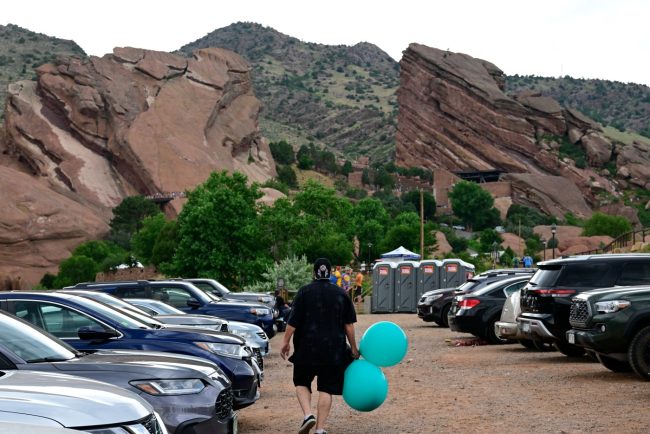
One other risk of the nitrous oxide party trend — fire accelerant (Letters)
One other risk of nitrous oxide — fire accelerant Re: “A common sight at concerts, nitrous oxide abuse is soaring,” Aug. 6 news story I appreciated your in-depth report on the expanding recreational use of nitrous oxide inhalation at Red Rocks and other concert venues. […]
OpinionOne other risk of nitrous oxide — fire accelerant
Re: “A common sight at concerts, nitrous oxide abuse is soaring,” Aug. 6 news story
I appreciated your in-depth report on the expanding recreational use of nitrous oxide inhalation at Red Rocks and other concert venues. The health hazards were accurately described, as was the ready availability of this ― what some label innocuous ― gas for cheap thrills, just to get that “Whomp-Whomp.”
In the 1970s, at an engineering university, I experienced firsthand parties powered by pilfered cylinders of nitrous oxide, N2O (N-Twenty as we ChemE geeks called it), and can attest that the article overlooked one major hazard. This stuff is a powerful oxidizer that, while not flammable by itself, will accelerate and intensify combustion of rubber balloons, clothing, hair, skin, eye tissue and other things that burn when used around open flames such as bongs, joints, and cigarettes. N2O is used by street racers to improve horsepower by increasing available oxygen; just add fuel and a spark to burn hotter, faster.
A common sight at concerts, nitrous oxide abuse is soaring, prompting health concerns
/*! This file is auto-generated */!function(d,l){“use strict”;l.querySelector&&d.addEventListener&&”undefined”!=typeof URL&&(d.wp=d.wp||{},d.wp.receiveEmbedMessage||(d.wp.receiveEmbedMessage=function(e){var t=e.data;if((t||t.secret||t.message||t.value)&&!/[^a-zA-Z0-9]/.test(t.secret)){for(var s,r,n,a=l.querySelectorAll(‘iframe[data-secret=”‘+t.secret+'”]’),o=l.querySelectorAll(‘blockquote[data-secret=”‘+t.secret+'”]’),c=new RegExp(“^https?:$”,”i”),i=0;i<o.length;i++)o[i].style.display="none";for(i=0;i<a.length;i++)s=a[i],e.source===s.contentWindow&&(s.removeAttribute("style"),"height"===t.message?(1e3<(r=parseInt(t.value,10))?r=1e3:~~r<200&&(r=200),s.height=r):"link"===t.message&&(r=new URL(s.getAttribute("src")),n=new URL(t.value),c.test(n.protocol))&&n.host===r.host&&l.activeElement===s&&(d.top.location.href=t.value))}},d.addEventListener("message",d.wp.receiveEmbedMessage,!1),l.addEventListener("DOMContentLoaded",function(){for(var e,t,s=l.querySelectorAll("iframe.wp-embedded-content"),r=0;r<s.length;r++)(t=(e=s[r]).getAttribute("data-secret"))||(t=Math.random().toString(36).substring(2,12),e.src+="#?secret="+t,e.setAttribute("data-secret",t)),e.contentWindow.postMessage({message:"ready",secret:t},"*")},!1)))}(window,document);
In a darkened room illuminated by the cherry glow of joints, I witnessed a N2O-filled balloon explode, resulting in serious burns and eye injuries to a friend. The smell of burnt flesh, eyelashes, brows and bangs took us all by surprise. Now that’s a buzzkill, kids. Party over. Replaced by a trip to the ER, where I got to explain what happened. Later, I heard of other similar mishaps, all preventable. Nothing new here, party at your own risk.
Robert Carrier, Erie
Why aren’t we talking about the scourge of plastics?
Re: “What is the goal of U.S. being present at plastic treaty talks?” Aug. 9 news story
I have been an advocate of recycling for years and I remain disappointed and surprised that no one seems to really care about the plastic dilemma we are facing. I think getting the word out with public service reminders and updates on the progress being made would be a good start.
Tell us how it works. Is the plastic really getting recycled?
Are there other steps we can take, like restaurants should provide only cardboard take-home containers? How about a “plastic tax” on some containers? Why not limit the sale of plastic water bottles to no less than 22 or 32 ounces? It would be great if I could take my empty laundry detergent bottles back to the store and have them refilled from a 50-gallon drum. It’s the same story with vehicle lubricants, washer fluid bottles, gallon jugs, etc. How about a $5 refundable deposit. It would sure assist the homeless and unemployed with a job that pays something. Come on people, let’s do something!
Bill Diemert, Highlands Ranch
Democrats need to a 2026 Contract with America
In 1994, Newt Gingrich developed with other Republicans the “Contract with America.” It laid out Republican’s legislative promises to the country. As a result, the Republicans won a sweeping election victory, turning the U.S. House Republican for the first time in 40 years. If the Democrats want to win in 2026, they need a new Contract with America. One that listens to and addresses voters’ needs as expressed by voters, not pundits, and the promise to send legislation to Trump all within its first 100 days. Make it big, make it beautiful, and make it serve the voters: Latino, Black, and White whose votes they lost in 2024.
Louis Kolker, Lakewood
Cure the sting of Rockies’ losses with free beer
Dick and Charlie Monfort are missing a golden opportunity to increase attendance at their sandlot-league games. There wouldn’t be an empty seat if every time the visiting team scored 7 or more runs, we got a free beer.
Jeffrey Stroh, Denver
Sign up for Sound Off to get a weekly roundup of our columns, editorials and more.
To send a letter to the editor about this article, submit online or check out our guidelines for how to submit by email or mail.

Time for the Power 4 conferences to break with the NCAA (Opinion)
When I attended the 1997 NCAA national convention in Nashville a vote was taken to pay players stipends. It only took 28 years to implement, and then only after the U.S. Supreme Court forced the NCAA’s hand. Now, the Wild West of college sports stands […]
ColumnistsWhen I attended the 1997 NCAA national convention in Nashville a vote was taken to pay players stipends. It only took 28 years to implement, and then only after the U.S. Supreme Court forced the NCAA’s hand.
Now, the Wild West of college sports stands at a defining crossroads. Once, the NCAA was synonymous with collegiate athletics, wielding unquestioned authority over everything from championships to player transfers and eligibility rules.
But the tides have shifted: today the Power 4 conferences — Big Ten, Southeastern Conference (SEC), Atlantic Coast Conference (ACC), and Big 12 — form the economic and competitive core of major college sports. Their resources, influence, and challenges have outgrown the outdated, one-size-fits-all NCAA governance model. The time has come for these leagues to take charge of their own future.
The University of Colorado and the other 67 college Power 4 athletic conferences should divorce themselves from the outdated National Collegiate Athletic Association (NCAA).
Amateurism, once the hallmark of the NCAA since its formation in 1906, officially died on July 1 of this year. College athletes can now “officially” make money in three ways: scholarships, third-party endorsement contracts, and direct payments from their schools (pay-for-play) with a salary cap of $20.5 million for the academic year 2025-2026.
The NCAA’s bureaucratic structure remains rooted in principles from a different era. Originally formed to oversee amateur athletics and promote student welfare, the NCAA built a rulebook for a world before billion-dollar television deals, player contracts, and the transfer portal. Its governance still attempts to treat Ohio State with a yearly athletic budget of over $250 million as equals to small schools in the BigSky conference like Idaho State with a budget of $15 million, despite vast chasms in budgets, facilities, and visibility.
Modern college athletics have become a high-stakes business. Yet the NCAA’s byzantine committee system ensures critical decisions move at the speed of its slowest members, not its most progressive. The result is gridlock: reforms are watered down or delayed, and the needs of major conferences are subordinated to the lowest common denominator.
The major conferences now command unparalleled resources and attention. According to industry estimates, their media rights alone dwarf most of the NCAA’s aggregate revenues. The Big Ten’s current television contract exceeds $1 billion a year, aligning it more with professional sports leagues than with smaller collegiate conferences.
These conferences fill gigantic stadiums, negotiate national endorsement deals, and make decisions on athlete welfare that have ripple effects across the sports landscape. The profiles and pressures facing these conferences cannot be compared to those in the remainder of the NCAA, which governs hundreds of other schools with dramatically different realities.
The disconnect between NCAA rules and modern reality is most evident in legal battles and compliance chaos. The NCAA fought a losing battle to preserve its definition of amateurism, culminating in the Supreme Court’s 2021 decision in NCAA vs. Alston, and later House vs. NCAA which finally opened the door for athlete compensation.
The ensuing NIL (name, image and likeness) marketplace for endorsements has outpaced NCAA regulations, leaving athletes, boosters, and institutions to navigate a landscape with minimal oversight and maximum confusion. There still is no equity with third-party endorsements.
Moreover, the NCAA’s compliance machinery has failed to evolve. Inconsistent rulings, drawn-out investigations, and rules that lag years behind current trends leave both universities and athletes vulnerable. As multi-million-dollar lawsuits pile up and courts increasingly side with athletes’ rights, the Power 4 conferences are left exposed by an organization too big and slow to protect their interests.
NCAA rules, designed for a 1950s version of college sports, can’t handle these new realities. Medical insurance that includes long-term coverage for chronic traumatic encephalopathy (CTE), mental health support, Title IX compliance, and even post-career transition programs are emerging as major priorities. Yet NCAA resource-sharing models mean Power 4 schools are often limited in how creatively or aggressively they can invest to meet these needs.
Professional sports leagues like the NFL and NBA show the value of governing bodies tailored to their organizations’ unique needs. Professional leagues set their own revenue models, compliance regulations, and discipline regimes — and adapt quickly when circumstances change. The Power 4 could emulate these models, building something suited to the 21st-century demands of college athletics.
The Power 4’s influence will only grow. Their schools, athletes, alumni, and fans already define the public image of college sports. Clinging to a single governance model that no longer fits undermines athlete welfare, innovation, and the competitive spectacle that makes college sports so beloved.
The NCAA is like the Titanic, a massive, once seemingly unsinkable institution that has long dominated college sports, steering it through decades of tradition and profit. Its rigid structure — built on amateurism and centralized control — mirrors the ship’s outdated design, ill-equipped for modern challenges.
Just as the Titanic’s crew underestimated the iceberg, the NCAA downplayed legal and cultural shifts.
The new NCAA controlled College Sports Commission (CSC) is taking over key functions like revenue-sharing enforcement while also giving large power schools 65% of voting rights.
Now sinking, the NCAA is offloading responsibilities to lifeboats. The athletes, once confined to the bottom deck, are finally getting a seat at the captain’s table, but it’s about to be submerged.
A new self-governing body isn’t just logical — it’s inevitable. The Power 4 conference can unlock creativity, ensure fair competition at the highest level, create equality and drive college athletics into the future.
It’s time for these conferences to take charge, leave the outdated NCAA behind, and acknowledge that college sports are unequivocally a business today that must float on its own.
Jim Martin was an adjunct law professor who taught Sports Law at CU and DU-chaired the University of Colorado committee on athletics for many years and has a passion for public speaking engagements. He can be reached atjimmartinesq@gmail.com.
Sign up for Sound Off to get a weekly roundup of our columns, editorials and more.
To send a letter to the editor about this article, submit online or check out our guidelines for how to submit by email or mail.
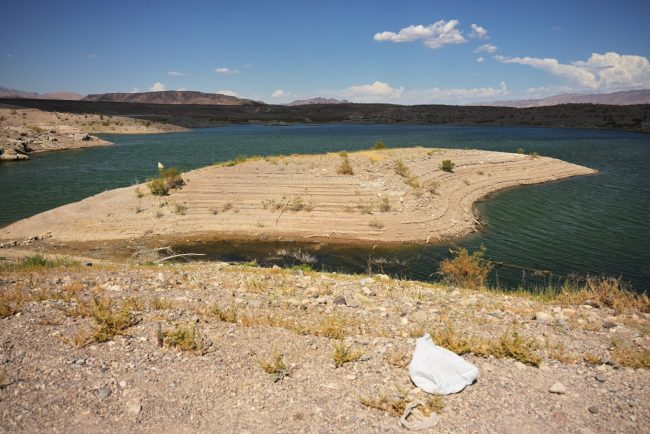
The Earth is drying out and we need to act urgently (Opinion)
You might not believe it if you’ve experienced one of the flash floods hammering the planet from Texas to Vietnam this summer, but the Earth is becoming drier — at least the parts where most people live. Given how this can affect every aspect of human existence, from farming […]
ColumnistsYou might not believe it if you’ve experienced one of the flash floods hammering the planet from Texas to Vietnam this summer, but the Earth is becoming drier — at least the parts where most people live. Given how this can affect every aspect of human existence, from farming to geopolitics, it’s past time we started treating this like the emergency it is.
Measurements from NASA’s Gravity Recovery and Climate Experiment satellites suggest the continents have been losing fresh water at an alarming rate since 2002, according to a recent study in the journal Science Advances.
Some parts of the planet are becoming wetter, especially in the tropics, but the drying parts are drying more quickly than the increasingly wet parts are getting wet. The drying parts are also spreading, gaining roughly two Californias’ worth of land every year and recently merging into “mega-drying” regions sprawling across vast stretches of continents.
One of these mega-drying regions starts in Alaska and covers much of Canada, from British Columbia to Manitoba. Another encompasses the U.S. Southwest and Central America. The largest covers three continents, from the British Isles, Europe and North Africa in the west all the way to China and Malaysia in the east. Three-quarters of the global population, or about 6 billion people, live in areas where fresh water has dwindled since 2002.
“Fresh water is finite, and we’re losing it,” Hrishikesh Chandanpurkar, a research scientist with Arizona State University and the paper’s lead author, told me. Much of the water ends up in the salty oceans, contributing more to sea-level rise than the melting of ice in Antarctica or Greenland.
Alarmingly, this trend accelerated after the 2014 El Niño event, the strongest on record, drove global temperatures higher by warming the water in the eastern Pacific. Since then, the global surface area experiencing drying extremes at any given moment has grown by about six Californias per year — despite the Earth spending most of that time in La Niña conditions, when water in the eastern Pacific is cooler. That suggests 2014 may have been a tipping point beyond which returning to normal wet-dry cycles may be impossible on human timescales.
That’s partly because most of the Earth’s drying places are historically arid anyway, Chandanpurkar explained. When they suffer extremes of drought, they tap already precious groundwater, which can take millennia to refill.
The American Southwest, in the throes of a decades-long megadrought, is a prime example. GRACE satellite data show the lower Colorado River basin — which includes parts of Arizona, California, Nevada and Mexico — has lost one Lake Mead’s worth of water, or about 28 million acre-feet, since 2003, according to a separate study earlier this year to which Chandanpurkar contributed. (An acre-foot is how much it takes to fill an acre with a foot of water.)
Climate change plays a big role here by making droughts longer and more severe and by sucking the water out of the ground through evaporation. But as with most other climate-related catastrophes, human behavior makes everything worse. In fact, the biggest factor in continental drying is groundwater loss, the study found — the primary driver of which is our own mismanagement.
That Lake Mead’s worth of water that has disappeared from beneath the lower Colorado basin has gone largely to irrigating alfalfa and other food for cows, much of which is exported. The Southwest is also the site of many planned data centers, an industry that might guzzle 74 billion gallons of water per year in the U.S. by 2028, according to a December study by the Lawrence Berkeley National Laboratory. About two-thirds of all the data centers built or planned in the U.S. since 2022 are in areas of high water stress, according to the nonprofit World Resources Institute.
This isn’t just a U.S. problem: Groundwater depletion is rampant in North Africa, the Middle East, the Tibetan Plateau and northern China, the study points out. One possible reason groundwater loss doesn’t dominate headlines the way climate change does is that too many people see it as a regional issue. Given that it now affects most of the Earth’s population and is making all the seas rise, it’s clearly a global issue.
And it’s a disaster with compounding effects. Lack of water affects agriculture, as in much of southern Africa, where a drought parched crops and livestock and put 90 million people in danger of acute hunger, according to a United Nations report last month. It affects commerce, as in the Panama Canal, where in late 2023 the water fell to levels too low to accommodate big ships. Droughts in Thailand and India boosted global sugar prices, while parched Spanish olive groves led to two years of soaring olive-oil prices. Loss of water and food sparks mass migration and violent conflicts.
Water shortages also lead to energy shortages. Hydroelectric power generates nearly a third of electricity on the U.S. West Coast, a figure in slow decline over much of the past decade. Failing hydro power in Zambia last year led to 21-hour blackouts.
The good news is that this crisis has solutions. We could start by curbing the fossil-fuel use heating up the planet. We could also eat less of that thirsty beef. Sure, those are probably the hardest things, but everything we do will take political will and foresight. We can grow drought-resistant crops and make data centers and other industries less water-intensive. We can rebuild water-collecting wetlands and improve our ability to capture the rain that will keep falling in those torrential downpours.
The first step, and maybe the easiest but most critical of all, is to stop thinking of fresh water as an infinitely replaceable resource.
Mark Gongloff is a Bloomberg Opinion editor and columnist covering climate change. This was written with assistance from Bloomberg columnist Liam Denning.
Sign up for Sound Off to get a weekly roundup of our columns, editorials and more.
To send a letter to the editor about this article, submit online or check out our guidelines for how to submit by email or mail.

Colorado is progressive but LGBTQ students need our support more than ever (Opinion)
An estimated 34,000 LGBTQ+ youth ages 13 to 17 live in Colorado, according to data from a federal survey on teen health. For many of these young Coloradoans, school is not a safe place. According to the Gay, Lesbian and Straight Education Network’s 2021 School […]
ColumnistsAn estimated 34,000 LGBTQ+ youth ages 13 to 17 live in Colorado, according to data from a federal survey on teen health. For many of these young Coloradoans, school is not a safe place.
According to the Gay, Lesbian and Straight Education Network’s 2021 School Climate Survey, 80% of U.S. LGBTQ+ youth feel unsafe at school. Experiences of harassment and violence are common for these students.
In a single school year, 76% of LGBTQ students experienced in-person verbal harassment, 49% were bullied, 23% were physically harmed or threatened, and 53.7% were sexually harassed, according to GLSEN’s survey and a 2024 survey by the Trevor Project. In Colorado, the Healthy Kids survey tells us that less than half of LGBTQ+ students feel they belong at their school.
As a Colorado resident for more than 20 years, I have seen the progress we have made in protecting our most vulnerable. When I graduated from a Colorado Springs high school in 2008, I could not have named a single classmate who was publicly “out” and I had never heard of a Gay-Straight Alliance, what is today called Genders & Sexualities Alliance Network (GSA). Since then, Colorado has enacted relatively robust legal protections for LGBTQ+ youth. We should be proud of what we have accomplished together. But there is still work to do.
Rates of anxiety and depression among LGBTQ youth are alarmingly high with 66% reporting recent symptoms of anxiety and 53% reporting recent symptoms of depression. According to the Trevor Project, almost 40% of LGBTQ+ young people seriously contemplated attempting suicide in the last year. Among transgender and nonbinary youth, this number rose to 46%. Rates were highest for students of color and 12% of all LGBTQ+ students had attempted suicide in the last year.
The link between these outcomes and school experiences are clear. LGBTQ students who experienced higher levels of in-person victimization were almost three times as likely as other LGBTQ students to have missed school in the past month. Their academic performance was lower, as was their self-esteem. Their rate of depression was elevated, and they were twice as likely to report that they did not plan to pursue any type of post-secondary education. Suicide attempt rates tripled among LGBTQ students who had been bullied in the past year.
While this data is sobering, it also offers potential solutions. GSA’s are student-led organizations that bring LGBTQ+ students and allies together. They provide a safe space for LGBTQ+ students, build community, and support advocacy efforts.
One-third of LGBTQ students have an active GSA or similar group at their school. Students who do are less likely to hear homophobic remarks and more likely to report staff intervening when they do. They are less likely to feel unsafe in school and less likely to have missed school. These students report better psychological well-being, lower depression levels and a lower likelihood of seriously contemplating or attempting suicide.
Every student deserves to feel safe and to know that they belong at school. Without costing taxpayers anything, GSA’s improve outcomes for future Coloradans. These organizations increase student safety, lower suicide rates, and improve school outcomes.
If you are a student or educator interested in starting a GSA at your school, GLSEN offers an online guide..
Rachel Ray is a new school counselor and soon-to-be graduate of the University of Denver’s school counseling program. She is a parent to two elementary students and has worked in Colorado public schools for four years.
Sign up for Sound Off to get a weekly roundup of our columns, editorials and more.
To send a letter to the editor about this article, submit online or check out our guidelines for how to submit by email or mail.

V-J Day through the eyes of a Colorado 5-year-old (Letters)
Remembering V-J Day in Denver Words spoken by Winston Churchill: “the signal for the greatest outburst of joy in the history of mankind” and “Weary and worn, impoverished but undaunted and now triumphant, we had a moment that was sublime.” He was speaking of V-E […]
OpinionRemembering V-J Day in Denver
Words spoken by Winston Churchill: “the signal for the greatest outburst of joy in the history of mankind” and “Weary and worn, impoverished but undaunted and now triumphant, we had a moment that was sublime.” He was speaking of V-E Day in Britain, but it could have been said of Denver later in 1945 on V-J Day, August 14.
A 5-year-old boy stood on the corner of 8th Avenue & Sherman Street watching the world go mad. He lived in the corner house at 791 Sherman St., and stood between his mother and father outside along the curb. On 8th Avenue, the traffic was bumper to bumper in both directions (8th became a one-way years later) but barely moving, and car horns drowned out most conversations. The boy was mystified, and maybe even frightened a little, as the streets during those war years were rarely, if ever, busy with traffic, certainly nothing like this insanity.
Drivers and passengers were exiting their cars and shouting happily at folks in other cars. They’d shake hands, hug the girls, and drink from bottles that were being passed around. The boy understood that somehow this was a celebration, like a super birthday party, as it seemed to fill the whole world in every direction as far as he could see.
That boy was me!
A man approached and handed Dad a brown colored bottle. Dad took it, tipped it back and drank deeply. I must have smiled or something as the man then handed it to me. Mom suddenly was standing between us as she shouted at him, and he quickly retreated, bottle in hand. Mom was sure mad about something.
Specific details of that day fade beyond that specific, albeit brief, moment for me. I know the party went on until well after dark, as after I was put to bed, the racket and bright headlights reflecting around the pulled shades kept me awake for a while. Thinking back, I must have been quite happy because everybody was so enraptured. Eventually, I dozed off and likely had pleasant dreams of cake, balloons, and ice cream.
V-J Day was the most vivid memory I have of World War II, and I’m glad it was of such an exciting, joyful moment in our history.
Harry Puncec, Lakewood
Thoughtful, thorough work on bond package
Re: “Council OKs bond package for November ballot,” August 5 news story
This spring, I volunteered to serve on one of five subcommittees composed of community members and Denver City Council representatives evaluating potential projects for the Vibrant Denver bond. My subcommittee focused on recreation centers, libraries, and housing.
I am a high school student in Denver Public Schools. It was an honor to represent young people in important discussions about Denver’s funding priorities. We reviewed projects proposed by the city council and the public and sorted them into three tiers of importance. We considered existing infrastructure and areas of highest need. We reviewed how usable the current buildings were. We submitted our recommendations to an executive committee that determined the projects that would go in the final bond.
I have heard criticism that the process was rushed and did not sufficiently involve members of the community, but I disagree. The majority of projects in the final bond proposal were originally proposed by the public. Over six weeks, we saw what people across the city wanted. In many cases, we were able to rank their proposals highly. Projects rated in the top tier by our subcommittee were more likely to be selected by the executive committee, which suggests that our input was taken seriously. In my experience, the subcommittee meetings allowed community members a chance to share their thoughts on each project and provide their own perspectives.
This November, Denver voters should pass the Vibrant Denver bond. It will provide the city with much-needed improvements and no raise in taxes.
James Scott, Denver
Sign up for Sound Off to get a weekly roundup of our columns, editorials and more.
To send a letter to the editor about this article, submit online or check out our guidelines for how to submit by email or mail.
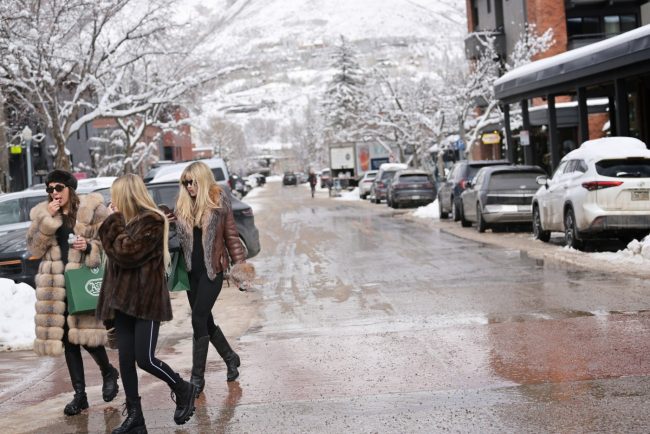
Living cheek to jowl with the super-rich in Jackson or Aspen: good threads and no housing (Opinion)
In December, Teton County, Wyoming, residents learned they were the wealthiest people in the country, making an average of $471,751 a year. That’s almost a half a million dollars a year for “every person living in Teton County in 2023 — regardless of age, health, […]
ColumnistsIn December, Teton County, Wyoming, residents learned they were the wealthiest people in the country, making an average of $471,751 a year. That’s almost a half a million dollars a year for “every person living in Teton County in 2023 — regardless of age, health, employment status.”
At the county seat in Jackson, town council member and economic consultant Jonathan Schechter made the “wealthiest” calculation in his “cothrive” newsletter. He’d crunched the latest U.S. Bureau of Economic Analysis estimates from 3,244 counties, parishes, and boroughs nationwide.
Schechter’s analysis made a small group of us — social critics with more than 100 collective years of Jackson Hole living — consider our new status in what Schechter called “the wealthiest county in the wealthiest country in the history of the world.” Our group of aging ski-bum, bicycle-riding gadflies wondered how the other 99.7% of America lived.
We needed to find out. We would start down the social ladder at a community that struggles to flop into second place. It’s Pitkin County, Colorado, site of the town of Aspen, a village about which we had only vague notions.
We would visit by bicycle over six days, observing Aspenites who would, we thought, represent more of the nation’s hoi polloi. Off we pedaled to cross the Income Gulf of America.
As we cycled up Colorado’s Roaring Fork Valley toward Aspen, we ran into the first of the locals. He was a 70-year-old impresario with all the bona fides of a longtime resident — greying braided ponytail, tank top, beater rig and a long resume as a roadie with the Grateful Dead.
He elaborated on his curriculum vitae, which included pre-concert street deals. “Detroit was easy,” he said. “They used to give me $500. That was a lot of money in those days.”
We parried. “We’re from the wealthiest community in the country.”
“Aspen is the most expensive,” he replied.
Pitkin’s annual per-capita income is $255,839, we riposted, as we headed up-valley. How spendy could this place be, we wondered, if it names a top hotel after a Nabisco cracker?
We were somewhere around Basalt on the edge of Aspen when the prices started to kick up. Numbers on the tap-insert-swipe thingies increased alarmingly. Finally arriving in Aspen, we rattled to a stop at a downtown bar, where beer came in $9 pints.
“Martini?” the menu suggested. Coming from the wealthiest county, we were practiced.
“I’ll take two.” Federal data said we could afford it. “And a burger.”
Twenty-five bucks for a Bombay Sapphire gin cocktail. Thirty bucks for a dead-cow patty so tall a mule would have to stretch its lips to take a bite of the towering brioche bun.
Perhaps we missed some of Schechter’s small print. A few billionaires must have skewed our lofty per-capita income figure. In fact, the median annual Teton County income is just $141,500, but still more than anyone in our peloton was making. And second-hand Ralph Lauren button-downs at Jackson’s Browse ’n’ Buy are up to $7.
We read local papers to dig deeper into the customs and culture of our Colorado subject. The papers said the sheriff was taking a trespasser to court who’d lived in a tree for 10 years. A humanitarian nonprofit was running out of money. The Chamber of Commerce was bragging about the coming tourist season.
The ads in glossy local magazines showed a population of the young, tan, fit and wealthy. Aspenites are polyglots, we realized, naming their stores in Italian — Gucci and Prada. In Jackson Hole we are glad to have Shirt off my Back and Lee’s Tees.
In Aspen, Louis Vuitton, which we deduced was French for “handbag,” offered the Aspen Platform Clog for $1,690. “We’ll take two!” we dreamed.
We went to a liquor store. A sharpie had marked $1,000 on one bottle of wine. We passed that up for a six pack — about what four dirtbags who fell out of the back pages of a 1980s Patagonia catalog could afford.
A ragged sign taped to the counter at the tap-insert-swipe thingie suggested that our communities were much more similar than we thought. We learned the sign had been there a year and a half but was still relevant.
“Jason needs a place to live,” it read.
Angus M. Thuermer Jr. is a contributor to Writers on the Range, writersontherange.org, an independent nonprofit dedicated to spurring lively conversation about the West. He is a reporter who has lived and worked as a journalist in Jackson, Wyoming for more than four decades.
Sign up for Sound Off to get a weekly roundup of our columns, editorials and more.
To send a letter to the editor about this article, submit online or check out our guidelines for how to submit by email or mail.
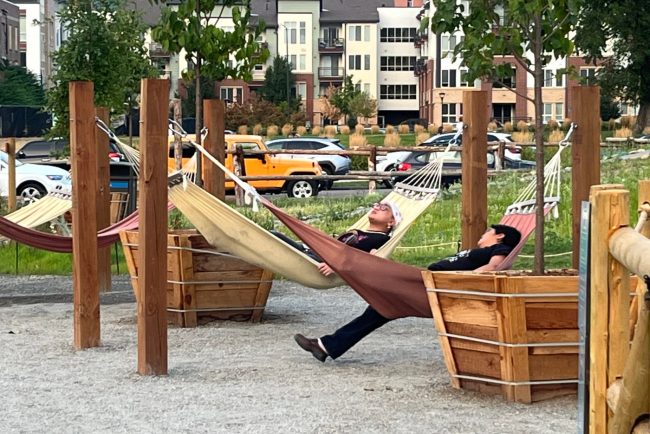
Ping pong, padel and public art find a (temporary) home in private Denver park
There is a lot packed into the new pocket park that opened on the corner of Ninth Avenue and Albion Street in East Denver. The site has just 1.7 acres, but planners managed to weave into the landscape playground equipment and picnic tables, hammocks and […]
OpinionThere is a lot packed into the new pocket park that opened on the corner of Ninth Avenue and Albion Street in East Denver.
The site has just 1.7 acres, but planners managed to weave into the landscape playground equipment and picnic tables, hammocks and walking paths. There are lounge chairs positioned under shady umbrellas, and benches made of giant logs, split down the middle.

There is even a notable piece of public art installed in the form of artist Ana Maria Hernando’s “To Let the Sky Know,” a tall trio of cloud-like bouquets made of lilac and yellow tulle that flutter in the wind. That piece fits neatly with the open space’s official name: Cloud 9 Park.
The attraction, designed by the landscape architecture firm Dig Studio, opened at the end of June, but it’s already popular. Visitors hang out all day and into the early evening, working on laptops, jogging across gravel trails, facing off at ping pong, corn hole and foosball. There’s a steady flow of people showing up to play on Denver’s first padel court. (The sport is a cross between pickleball, tennis, and squash, and players can reserve a time by using an app or downloading a QR code.)
Nearly everything is free.
If it sounds too good to be true, well, in a sense it is — or at least it is only true for a year or two, or maybe three. Then Cloud 9 will likely disappear.
The park occupies a space in the middle of 9+CO, the burgeoning development that is turning the former University of Colorado medical learning campus into a planned community. The 26-acre parcel is already home to apartment buildings, retail shops, offices, a movie theater and a number of restaurants, such as Blanco, Culinary Dropout and newcomer Le French. Construction continues at a steady pace and will eventually consume the new park.
A project from Denver’s Continuum Partners (recently joined by investment concerns M Development and Carlton Associates), 9+CO is about as urban-positive as a money-making development can be. It’s pedestrian-friendly and restores the traditional street grid that the old university facilities displaced. The buildings are low-rise and design-forward. The spacing is dense, but breathable. There’s not much for anti-infill critics to complain about.
Considering the site was once designated for a new Walmart — until locals rose up against that idea — the development is a nice gift to a neighborhood that needed a lift.
But 9+CO, which has been in progress since 2015, lacked a few things that a perfect planned community needs, and the developers clearly knew it, and so their motives for investing in a park are both pro-community and pro-commercial success.
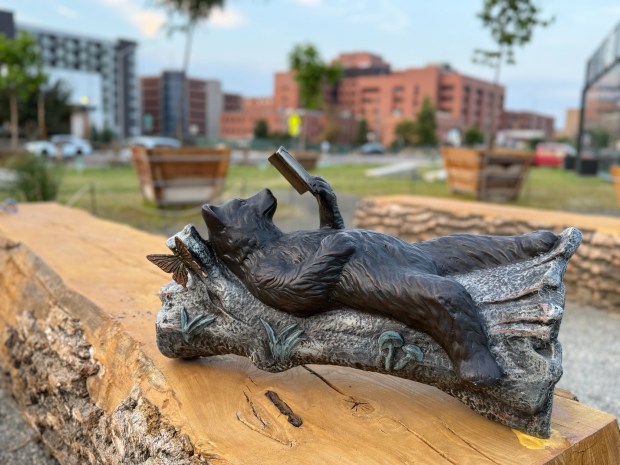
The area is not exactly affordable. Denver rents are high, in general, and the buildings here fall in line with that. There are affordability options built-in, but it would not be described as a cheap place to live. The restaurants, bars and take-out spots are not high-end, but they have price points that would make it difficult for a typical family to enjoy on more than special occasions.
In a way, 9+CO also lacked a soul, a center where people could congregate and get to know each other, connect casually like neighbors. People zipped into the parking garages and up elevators. They took in meals or ice cream cones, but that was as much a transactional experience as it was a communal moment.
The new park is a clever remedy, and a generous move on the part of the developers who could just as easily have upped their marketing budget instead of creating an amenity that offers to make the lives of people for miles around a little bit better, even if it is temporary. People can gather meaningfully, leisurely, for free, and outdoors. It’s a very Colorado move.
Dig Studios took that as a cue, designing the park in a way that honors the state’s natural landscape. The existing space, in the center of a decade of construction, already had stockpiles of dirt on site. Instead of removing them, they were reshaped into mounds and planted, giving the space the feel of rolling hills.
Working with Keene Landscape Management, they seeded native grasses and flowering plants that are both environmentally smart and attractive to pollinating insects. They installed Bermuda grass instead of water-hungry Kentucky blue grass.
They included elements that are functional while giving off deep Colorado vibes, like lining the perimeter of the park with post-and-rail style fencing commonly seen on the ranches across the plains. They dotted the grounds with small bronze sculptures of bears, mirroring the giant mural depicting a bear balancing on a precarious high wire that artist Kevin Sloan painted on one of the development’s garages that faces Colorado Boulevard.
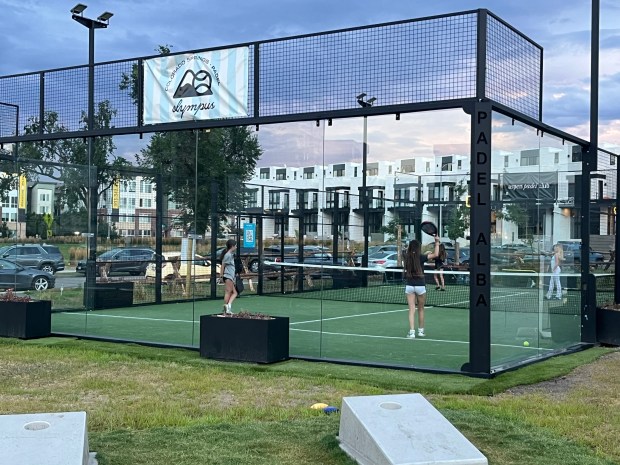
The park is surrounded on two sides by buildings that rise about eight stories tall, so they created a view from above. Gaze down at the space from one of the nearby apartments and you can make out a “CO” formed by paths and the playground space.
Dig — the firm behind the new Nature Play outdoor space at the Denver Museum of Nature & Science and also Paco Sánchez Park in West Denver — kept the paths wide, which will allow food trucks to set up on-site, or for tents that might accommodate an art fair or maybe a stage for an afternoon concert.
Continuum plans to take advantage of all those possibilities. It envisions programming for families, and maybe some evenings of music. So far, there has been a “community game night,” a block party and a kid-welcoming “inflatables in the park” day. More events are coming to activate the space.
Though for how long is undetermined. The park is located in a key spot for 9+CO, and Continuum has designs on the space. The company is being up front about that, acknowledging that it will eventually fill it in like the rest of the development. It will likely integrate the park’s amenities into the surrounding areas, though the plan for that is not yet clear.
But in the short-term, the park is something of an oasis, and an example of how a city works best when the interests of developers overlap with the needs of a neighborhood, and everyone works together to make positive things happen.
Cloud 9 Park might not be here for a long time, but it’s here for a good time. That makes it novel, and very inviting.


